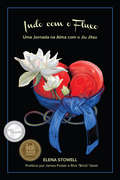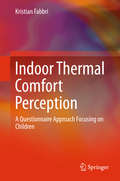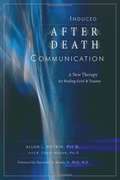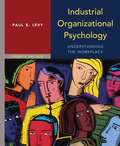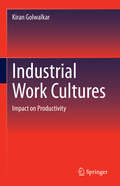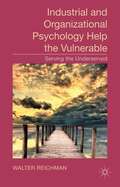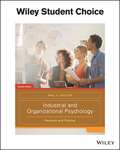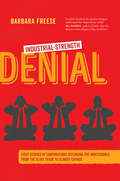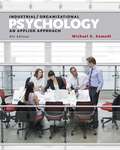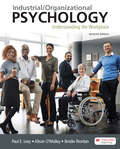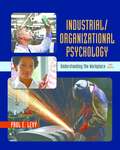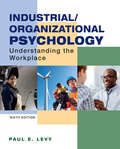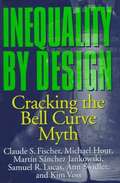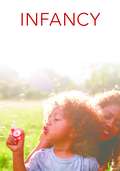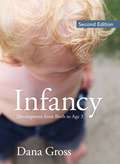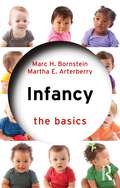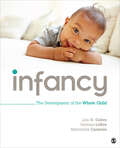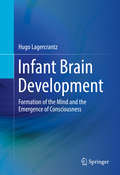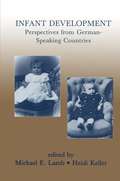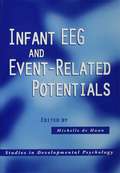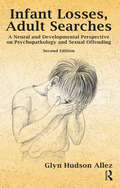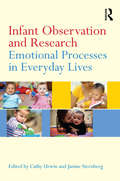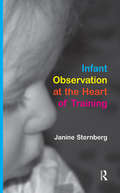- Table View
- List View
Indo Com o Fluxo: Uma Jornada na Alma com o Jiu Jitsu
by Elena StowellPor o que pareceu ser uma eternidade e provavelmente foi, Elena Stowell vagou sem rumo em uma prisão pessoal de insegurança e falta de propósito após a sua filha Carly de apenas 14 anos morrer repentinamente diante de seus olhos. Por uma combinação de milagre e necessidade, ela entrou em uma Academia de Jiu-Jitsu em Seattle e lá rolou pela primeira vez em sua vida. Através desta experiência e de outras que se seguiram, Elena descobriu que os princípios desta forma de arte marcial e da cura eram os mesmos. Com uma honestidade brutal e um refrescante equilíbrio de humor e introspecção, a história de Elena nos lembra a nunca parar a procura de coisas boas dentro de nós mesmos.
Indoor Thermal Comfort Perception
by Kristian FabbriProviding a methodology for evaluating indoor thermal comfort with a focus on children, this book presents an in-depth examination of children's perceptions of comfort. Divided into two sections, it first presents a history of thermal comfort, the human body and environmental parameters, common thermal comfort indexes, and guidelines for creating questionnaires to assess children's perceptions of indoor thermal comfort. It then describes their understanding of the concepts of comfort and energy, and the factors that influence that perception. In this context, it takes into account the psychological and pedagogical aspects of thermal comfort judgment, as well as architectural and environmental characteristics and equips readers with the knowledge needed to effectively investigate children's perspectives on environmental ergonomics. The research field of indoor thermal comfort adopts, on the one hand, physical parameter measurements and comfort indexes (e. g. Predicted Mean Vote (PMV) or adaptive comfort), and on the other, an ergonomic assessment in the form of questionnaires. However the latter can offer only limited insights into the issue of comfort, as children often use different terms than adults to convey their experience of thermal comfort. The books aims to address this lack of understanding with regard to children's perceptions of indoor thermal comfort. The book is intended for HVAC engineers and researchers, architects and researchers interested in thermal comfort and the built environment. It also provides a useful resource for environmental psychologists, medical and cognitive researchers.
Induced After Death Communication: A New Therapy for Healing Grief and Trauma
by Allan L. Botkin R. Craig HoganInduced After-Death Communication (IADC) is a new therapy for grief and trauma that has helped thousands of people come to terms with their grief by allowing them the experience of private communication with their departed loved ones. Botkin, a clinical psychologist, created the therapy while counseling Vietnam veterans in his work at a Chicago area VA hospital. Botkin recounts his initial accidental discovery of IADC during therapy sessions with Sam, a Vietnam vet haunted by the memory of a Vietnamese girl he couldn't save. During the session, quite unexpectedly, Sam saw a vision of the girl's spirit, who told him everything was okay; she was at peace now. This single moment surpassed months-years-of therapy, and allowed Sam to reconnect with his family. Since that 1995 discovery, Botkin has honed IADC and used it to successfully treat countless patients-the book includes dozens of case examples-and has taught the procedure to therapists around the country. Induced After-Death Communication is the inside story of a revolutionary therapy that will profoundly affect how grief and trauma are understood and treated.
Industrial Organizational Psychology: Understanding the Workplace (Fourth Edition)
by Paul LevyThe new fourth edition introduces students to the psychological factors active in the workplace, including the psychology of the workforce, employee health and well-being, and various dynamics of work interaction. It includes recent studies focusing on new technologies, new work habits, and newly emergent organizational structures.
Industrial Work Cultures: Impact on Productivity
by Kiran GolwalkarThis book addresses technical issues and human factors mainly from the mechanical, chemical, electrical, metallurgical and civil engineering fields as these make significant contribution to the economy and progress of a nation. It discusses factors that assist development of efficient, ideal work cultures and their influence on the productivity. It addresses undesirable traits in the working personnel which can cause deviations from good working practices. Suggestions are given for encouraging better performance and corrective actions for improvement of unsatisfactory working.
Industrial and Organizational Psychology Help the Vulnerable
by Walter ReichmanIndustrial and Organizational Psychology Help the Vulnerable documents a new direction for industrial and organizational psychology. The chapters are written by psychologists who have used the methods, procedures and theories of industrial and organizational psychology to help the vulnerable people of the world.
Industrial and Organizational Psychology: Research and Practice
by Paul SpectorThe field of industrial and organizational psychology continues to see attention and growth and has become one of the major applied specialties in the study of psychology. Since findings from research in this field are relevant to everyone who has held a job, and the field has developed proven methods that businesses and organizations need, industrial and organizational psychology is an excellent demonstration of how society can benefit from the study of psychology. The 6th Edition of Industrial and Organizational Psychology incorporates all new and updated literature that has been written on the topic since the 5th edition. Spector's goal is to provide an overview and comprehensive understanding of organizational psychology. Each of the major areas that comprise industrial and organizational psychology is covered in five parts: introduction to the discipline; assessment of jobs, performance, and people; selecting and training employees; the individual and the organization; and the social context of work.
Industrial-Strength Denial: Eight Stories of Corporations Defending the Indefensible, from the Slave Trade to Climate Change
by Barbara FreeseCorporations faced with proof that they are hurting people or the planet have a long history of denying evidence, blaming victims, complaining of witch hunts, attacking their critics’ motives, and otherwise rationalizing their harmful activities. Denial campaigns have let corporations continue dangerous practices that cause widespread suffering, death, and environmental destruction. And, by undermining social trust in science and government, corporate denial has made it harder for our democracy to function. Barbara Freese, an environmental attorney, confronted corporate denial years ago when cross-examining coal industry witnesses who were disputing the science of climate change. She set out to discover how far from reality corporate denial had led society in the past and what damage it had done. Her resulting, deeply-researched book is an epic tour through eight campaigns of denial waged by industries defending the slave trade, radium consumption, unsafe cars, leaded gasoline, ozone-destroying chemicals, tobacco, the investment products that caused the financial crisis, and the fossil fuels destabilizing our climate. Some of the denials are appalling (slave ships are festive). Some are absurd (nicotine is not addictive). Some are dangerously comforting (natural systems prevent ozone depletion). Together they reveal much about the group dynamics of delusion and deception. Industrial-Strength Denial delves into the larger social dramas surrounding these denials, including how people outside the industries fought back using evidence and the tools of democracy. It also explores what it is about the corporation itself that reliably promotes such denial, drawing on psychological research into how cognition and morality are altered by tribalism, power, conflict, anonymity, social norms, market ideology, and of course, money. Industrial-Strength Denial warns that the corporate form gives people tremendous power to inadvertently cause harm while making it especially hard for them to recognize and feel responsible for that harm.
Industrial/Organizational Psychology: An Applied Approach
by Michael G. AamodtStriking a balance between research, theory, and application, the eighth edition of INDUSTRIAL/ORGANIZATIONAL PSYCHOLOGY: AN APPLIED APPROACH helps readers discover the relevance of industrial/organizational psychology in everyday life through practical application. Readers analyze topics such as resume writing, interview survival, job description authoring, performance appraisal, employment law, job satisfaction, work motivation, and leadership. Humor, case studies, real-world examples, and a friendly writing style make the book both readable and interesting. Numerous charts, tables, flowcharts, and exercises help readers conceptualize complex issues.
Industrial/Organizational Psychology: An Applied Approach (Sixth Edition)
by Michael G. AamodtStriking a balance between research, theory, and application, the sixth edition of INDUSTRIAL/ORGANIZATIONAL PSYCHOLOGY: AN APPLIED APPROACH prepares readers for their future careers through a combination of scholarship, humor, case studies, and practical applications. Readers will see the relevance of industrial/organizational psychology their everyday lives through such practical applications as how to write a resume, survive an employment interview, write a job description, create a performance appraisal instrument, and motivate employees. Charts and tables simplify such complicated issues as employment law, job satisfaction, work motivation and leadership.
Industrial/Organizational Psychology: Understanding the Workplace
by Paul Levy Alison O'Malley Brodie RiordanIndustrial/Organizational Psychology, Seventh Edition, by Paul E. Levy, Alison O’Malley, and Brodie Riordan, is the trusted introduction to the field of I/O that blends a personable writing style with a concise, up-to-date view of the research.
Industrial/Organizational Psychology: Understanding the Workplace
by Paul LevyWritten by a leading researcher in one of the nation's top I/O programs, Paul Levy's text has long been acclaimed for its concise, research-based approach, and personable writing style. The new edition again offers a thoroughly contemporary perspective on the field, with the latest research and new ways for students to explore what's happening in I/O psychology today.
Industrial/Organizational Psychology: Understanding the Workplace
by Paul LevyWritten by a leading researcher in one of the nation’s top I/O programs, Paul Levy’s text has long been acclaimed for its concise, research-based approach and personable writing. With this thoroughly updated new edition, students have ample opportunities to explore what’s happening in I/O psychology today, through voices directly from the field (Practitioner Forum), brief takes on current events issues (I/O Today), applied practice (Taking it to the Field), and critical and applied exercises at the end of each chapter. Supplementary resources include a thorough Instructors Manual with additional practice activities as well as teaching tips, and a robust test bank.
Inequality by Design: Cracking the Bell Curve Myth
by Claude S. Fischer"Inequality by Design's most important findings describe an America deeply stratified by class, an America in which equal opportunity remains only and idle dream...[It] may well after the public discussion...with a shot across the bow of the nation's policymakers."--Lingua Franca "One of the most important books on what divides America socially and economically since the work of Christopher Jencks and his Harvard colleagues nearly a quarter century ago."--Daniel Bell
Infancy: Development from Birth to Age 3
by Dana GrossDana Gross's sensitive and engaging teaching voice seamlessly weaves together research and theory with current issues of diversity and culture. This latest edition provides students with enough detail to understand methodological issues, explore both practically and theoretically important topics, and engage in thinking critically about development from birth to age 3.
Infancy: Development from Birth to Age 3 (Second Edition)
by Dana GrossFor courses in Infancy and Early Childhood Development, with a focus on birth to age 3. Infancy: Development from Birth to Age 3 helpsstudents understand the role of infant development research and how they may apply it to their own lives as well as the broader implications upon public policies. Students are also presented with the relevant historical information in many of the chapters to provide a broader perspective and highlight how far we've come in our understanding of the first 3 years of life. Issues of diversity and multicultural experience are also incorporated, illustrating how nature and nurture work together.
Infancy: The Basics (The Basics)
by Marc H. Bornstein Martha E. ArterberryInfancy: The Basics offers an introduction to the developmental science behind the fascinating world of infant development. This book takes the reader from before birth through the moment infants come into the world seemingly unable to do much but eat, eliminate, and sleep, and across the few short, incredible years, to when infants are walking, talking, thinking humans with clear preferences, wishes, and dreams, having already forged strong long-lasting relationships. Dispelling common myths and misconceptions about how infants’ perception, cognition, language, and personalities develop, this accessible evidence-based book takes a novel whole-child approach and provides insight into the joint roles of nature (biology) and nurture (experiences) in infant development, how to care for babies to give them the best start in life, and what it means for infants to become thinking communicating social partners. Topics in this book are covered with an eye firmly fixed on how infants’ first years set the stage for the rest of their lives. By helping us understand infants, experts Marc H. Bornstein and Martha E. Arterberry give us the opportunity to learn about the resiliency of our species and the many different contexts in which families rear infants. They cover key topics, including how babies are studied scientifically, prenatal development and the newborn period, how infants explore and understand the world around them, how infants begin to communicate, how infants develop an emotional life, personality, and temperament, how infants build relationships, and how parents succeed in bringing up babies in challenging circumstances. This concise clear guide to the years from before birth to 3 is for students of developmental psychology, pediatric medicine and nursing, education, and social work. It also for all parents and professionals caring for infants, who want to understand the secret world of infancy.
Infancy: The Development of the Whole Child
by Vanessa LoBue Lisa M. Oakes Marianella CasasolaLisa M. Oakes, Vanessa Lobue, and Marianella Casasola′s Infancy: The Development of the Whole Child unites historically important and cutting-edge theories and research to illustrate the development of the whole child from birth to age three. Topically organized and written in a conversational tone, the text illustrates the interconnected nature of development through links within its bio-psycho-social coverage. Through its inclusive approach, students see individual similarities and differences in development as a function of factors such as culture, language experience, parenting style, and socioeconomic status. Stories from the authors′ own experiences with infants highlight connections between research and parenting, social policy, and everyday contexts, effectively bringing the topics to life for students. Included with this title: LMS Cartridge: Import this title’s instructor resources into your school’s learning management system (LMS) and save time. Don’t use an LMS? You can still access all of the same online resources for this title via the password-protected Instructor Resource Site. Learn more.
Infancy: The Development of the Whole Child
by Vanessa LoBue Lisa M. Oakes Marianella CasasolaLisa M. Oakes, Vanessa Lobue, and Marianella Casasola′s Infancy: The Development of the Whole Child unites historically important and cutting-edge theories and research to illustrate the development of the whole child from birth to age three. Topically organized and written in a conversational tone, the text illustrates the interconnected nature of development through links within its bio-psycho-social coverage. Through its inclusive approach, students see individual similarities and differences in development as a function of factors such as culture, language experience, parenting style, and socioeconomic status. Stories from the authors′ own experiences with infants highlight connections between research and parenting, social policy, and everyday contexts, effectively bringing the topics to life for students. Included with this title: LMS Cartridge: Import this title’s instructor resources into your school’s learning management system (LMS) and save time. Don’t use an LMS? You can still access all of the same online resources for this title via the password-protected Instructor Resource Site. Learn more.
Infant Brain Development
by Hugo LagercrantzThis book discusses the main milestones of early brain development and the emergence of consciousness, within and outside the mother's environment, with a particular focus on the preterm infant. These insights offer new perspectives on issues concerning fetal pain, awareness in newborns, and the effects of current digital media on the developing infant brain. Among the topics covered: #65533; Brain patterning, neural proliferation, and migration. #65533; The stress of being born and first breaths. #65533; The stream of consciousness. #65533; Parenting and stimulating the brain of the child. #65533; The moral status of the fetus and the infant. Infant Brain Development is an excellent resource for researchers, clinicians and related professionals, and graduate students across a variety of disciplines including developmental psychology, pediatrics, neurobiology, neuroscience, obstetrics, nursing and medical ethics. It is written with historic and philosophical remarks of interest for a broad readership. --- "This book is a joy to read for anyone interested in understanding where biology is heading in the 21st century, and it is essential for those who work in child development. " Eric Kandel, University Professor, Columbia University, Co-Director, Mortimer B. Zuckerman Mind Brain Behavior Institute, Nobel Laureate in Medicine 2000 "With the precision of a scientist, the depth of a philosopher, and the heart and sensitivity of a pediatrician, Hugo Lagercrantz weaves a story as readable and engrossing as any mystery novel, linking brain, genes, the environment, and behavior to explain the development of the mind of a newborn. A tour de force!" Patricia K. Kuhl, The Bezos Family Foundation Endowed Chair in Early Childhood Learning, Co-Director, Institute for Learning & Brain Sciences, University of Washington "This book is a noble and valiant effort by Dr. Lagercrantz to explain the immensely complex issue of normal and pathological development of the human brain in simple terms that are accessible to the general public. " Pasko Rakic, Duberg Professor of Neuroscience and Neurology, Yale University School of Medicine
Infant Development: Perspectives From German-speaking Countries
by Michael E. Lamb Heidi KellerMost German-speaking researchers in the area of infant development are familiar with the research conducted in English. However, most English-speaking researchers are relatively unaware of the work currently being done in German. This volume is designed to remedy this imbalance and to promote international collaboration. The book's contributors -- an exciting and innovative group of German-speaking scholars -- provide up-to-date summaries of theoretical, methodological, and empirical perspectives on development. They review evidence and present points of view of great interest to all people who are committed to furthering our collective understanding of development in infancy.
Infant EEG and Event-Related Potentials (Studies in Developmental Psychology)
by Michelle De HaanInfancy is a time of rapid growth, when brain plasticity is at a maximum. Event-related potentials (ERPs) are one of the few methods that can easily and safely be used to study this process, and have led to exciting discoveries about human brain functioning and the neural basis of cognition. Over recent years, there has been a massive rise in the level of interest in ERPs and this book considers the advantages which they offer to researchers and clinicians. In particular, it looks at the benefits of this form of neuroimaging as a non-invasive tool for detecting impairments in brain and cognitive development very early in life. The potential use of ERPs for clinical settings is also explored in detail. The contributions are all from eminent researchers in the field and represent the latest thought on the topic. Infant EEG and Event-Related Potentials explains the basics of event-related potentials for those less familiar with the procedures and terminology, as well as offering a valuable handbook of the latest theories and empirical findings for those working in the field. This will be a valuable source for those interested in developmental psychology and neuropsychology, and for clinicians interested in application of ERPs.
Infant Losses; Adult Searches: A Neural and Developmental Perspective on Psychopathology and Sexual Offending
by Glyn Hudson-AllezAn innovative view of the development of psychopathology and sexual offending. In an exciting synthesis of neuroscience, developmental, and social psychology with forensic and criminal literature, it offers a fresh perspective as to the reasons that may precipitate some individuals into violent or sexual offences. The book is written for clinicians of all modalities, although its very readable style, make it accessible to anyone with an interest in this area.
Infant Observation and Research: Emotional Processes in Everyday Lives
by Cathy Urwin Janine SternbergPsychoanalytic infant observation is frequently used in training psychoanalytic psychotherapists and allied professionals, but increasingly its value as a research method is being recognised, particularly in understanding developmental processes in vulnerable individuals and groups. This book explores the scope of this approach and discusses its strengths and limitations from a methodological and philosophical point of view. Infant Observation and Research uses detailed case studies to demonstrate the research potential of the infant observation method. Divided into three sections this book covers infant observation as part of the learning process how infant observation can inform understanding and influence practice psychoanalytic infant observation and other methodologies. Throughout the book, Cathy Urwin, Janine Sternberg and their contributors introduce the reader to the nature and value of psychoanalytic infant observation and its range of application. This book will therefore interest a range of mental health practitioners concerned with early development and infants' emotional relationships, as well as academics and researchers in the social sciences and humanities.
Infant Observation at the Heart of Training
by Janine SternbergThe study of infant observation is widely used as part of training to become a psychoanalytic psychotherapist; the skills learned through infant observation can be widely applied to practicing analysis with all ages. Through the delineation of the views of writers and teachers of infant observation and her own empirical research, the author addresses the reasons why infant observation is a vital part of training for all analysts.
